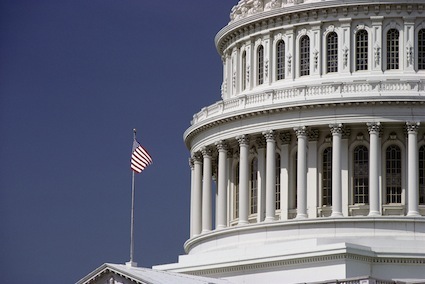New Bill Pushes Reform of Universal Service Fund Support
Relying on landline fees to support universal broadband doesn't cut it, senators signal

The smarter way to stay on top of the multichannel video marketplace. Sign up below.
You are now subscribed
Your newsletter sign-up was successful
A new bill, the Reforming Broadband Connectivity Act, is asking the Federal Communications Commission to look beyond the customers of declining landline phone service for the subsidies it will need to power universal broadband.
Currently, the FCC‘s Universal Service Fund support for broadband in rural and lower-income areas is primarily subsidized by fees on traditional landline service, in part because it was unclear whether the regulator had the authority to such fees on broadband providers.
Sens. Amy Klobuchar (D-Minn.), co-chair of the Senate Broadband Caucus, and John Thune (R-S.D.) have teamed up on a bill that charges the FCC with opening a rulemaking to “reform the contributions system, taking into account the fairness and the relative burden any changes in fees will have on consumers and businesses, as well as the impact the proposed changes to the contribution system will have on seniors.”
Also: FCC Tops $2 Billion in Emergency Broadband Funds for Schools, Libraries
USF fees are passed along to customers on their monthly bills.
“In 2021, we should be able to bring high-speed internet to every family in America — regardless of their zip code,” Klobuchar said in a statement. “This bill will help ensure we have the resources to keep the Universal Service Fund strong so we can continue to expand access to broadband."
Added Thune: “It is crucial that rural communities across South Dakota have access to reliable broadband services.”
The smarter way to stay on top of the multichannel video marketplace. Sign up below.
The senators pointed out that relying on landline subsidies for USF, which supports rural health care, service to low-income households and school and library broadband access, even as landline use declines in favor of wireless and VoIP, "places a disproportionate impact on seniors, who are significantly more likely to use a landline than younger adults."
The Biden administration is hardly relying on the USF alone to close the divide. In fact, it has been arguing that the $65 billion it has allocated for broadband buildout and adoption in the new infrastructure package that passed in Congress — plus earlier, COVID-19-related, emergency broadband funding — should be enough to get the job done, though it was unclear whether that presumed continued stable USF funding.
Contributing editor John Eggerton has been an editor and/or writer on media regulation, legislation and policy for over four decades, including covering the FCC, FTC, Congress, the major media trade associations, and the federal courts. In addition to Multichannel News and Broadcasting + Cable, his work has appeared in Radio World, TV Technology, TV Fax, This Week in Consumer Electronics, Variety and the Encyclopedia Britannica.

